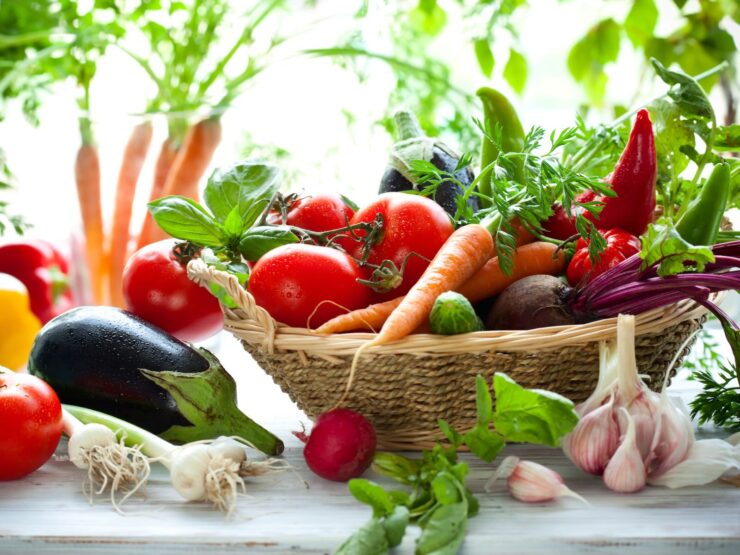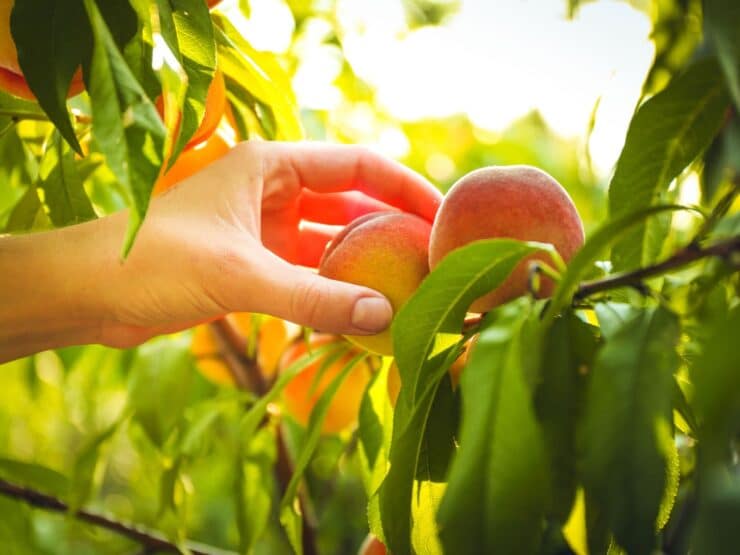A key part of the Mediterranean diet – and any healthy approach to cooking – is the concept of eating in season. There are many health benefits to eating produce in season. Also, from an environmental perspective, eating seasonal foods is the way to go! Seasonal eating can enhance your nutrition and your overall health.

Have you ever bought a tomato in winter, only to find it has a bland flavor and unappealing texture? This has happened to me, and it’s always disappointing! When we purchase a tomato from the grocery store during off-season (in the US this means outside of late summer/early fall), it was likely picked far away. That means it was harvested before it had time to reach peak ripeness on the vine.
Eating in season helps to eliminate this issue. Seasonal eating can help you maximize both flavor and nutrient intake. That’s a win, win!
The idea of eating seasonal produce really becomes exciting for me during early spring. Produce is beginning to fill the shelves at grocery stores, farmer’s markets are re-opening, and we begin to get our first peek at the fresh fruits and vegetables we’ve been missing all winter long. This excitement has often led me to wonder– what is the nutritional benefit of eating food that is “in season” versus food that may be “out of season”?
Nutritional Benefits of Eating in Season
The biggest impact of seasonal eating will be on the nutrient density of these foods. When produce is sold out of season, chemicals are used to speed ripening during travel from the field to the grocery store shelf. When chemical ripeners are used, foods aren’t given time to reach full ripeness naturally (on the vine, on the tree, or in the ground). Subsequently, these grown foods can’t absorb valuable nutrients from the soil. Because of this, you’re going to end up with a food that is either less nutrient-dense– or food that required a lot of chemicals to get it to where you expect it to be.
Usually, what this means for a consumer at the grocery store is less tasty food. Produce purchased out of season isn’t as vibrant, isn’t as colorful, and simply isn’t as flavorful. Eating in season will ensure that you have a much better chance of your food tasting amazing.

Eating Local Means Eating in Season
It would be impossible to talk about eating in season without discussing local foods. Most produce is going to be in season somewhere. To improve your chances of getting the most nourishing and tasty produce, focus on eating items that are seasonal to your area. Local produce that is in season right now is your best bet. The closer you are physically to where that produce was grown, the more likely it was picked at peak ripeness. This is why farmer’s markets and local farm box subscriptions are a great place to start. The closer you physically are to the source of the food, the fresher it will be.
Environmental Impact of Seasonal Eating
Eating local foods in season also has a positive environmental impact. A lot goes into transporting food across and between countries. The more local food you eat, the more you can cut down on the amount of travel that food has had to do to get to you, thus lowering your carbon footprint.
Of course, the best possible option for eating in season would be having your own garden. However, many of us don’t have the time or space for this luxury. The next best option is to shop at your local farmer’s market. The benefit of eating something that was grown for the market, versus the grocery store, is that it won’t have to travel far to get to you. When a farmer is growing food to stock a grocery store– even a local one– they have to produce a larger amount of food. That means farmers need to harvest ahead of time to account for the extra volume needed for grocery stores. By comparison, food at farmer’s markets has been given more time to reach full ripeness. This means you get to reap the nutritional benefits of fresh produce at its very best.
Learn more about healthy seasonal cooking by exploring my Mediterranean recipes. A special thanks to my nutritionist Lindsea Willon, who helped me learn a lot about this topic through our various discussions about Mediterranean cuisine.
Leave a Reply